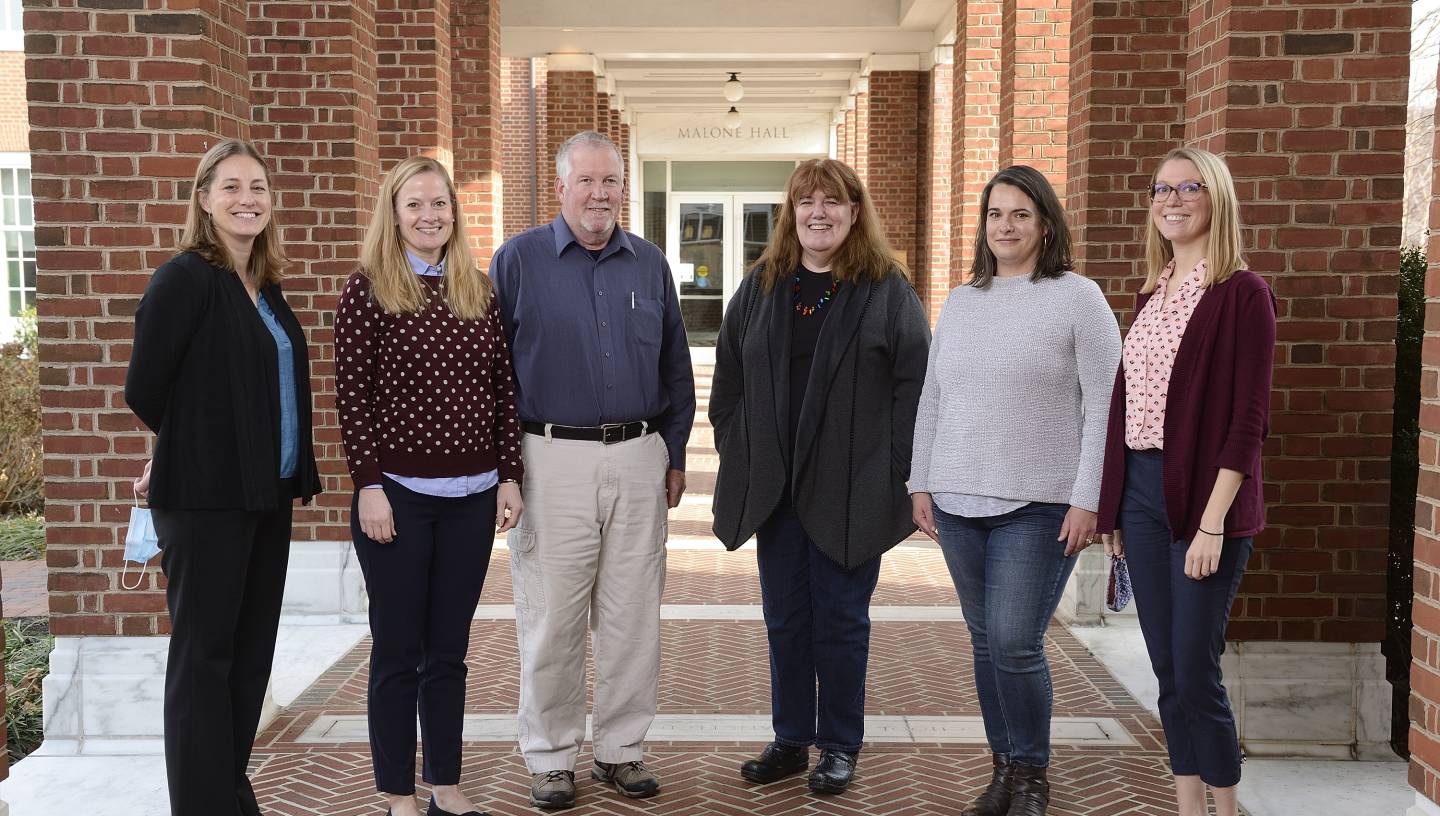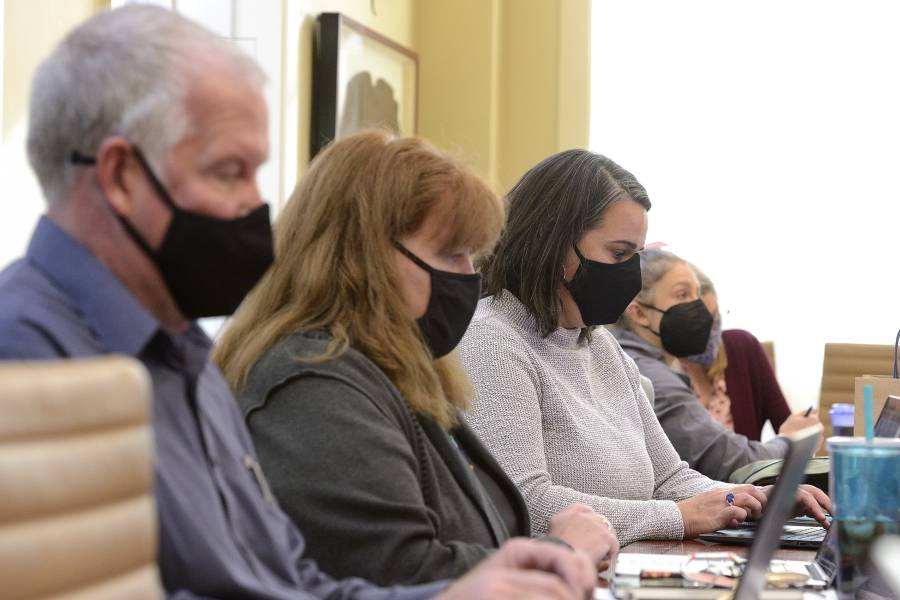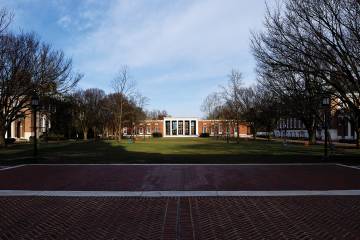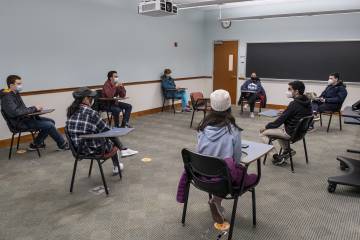To say that managing the COVID-19 pandemic at Johns Hopkins has been team effort would be a massive understatement. From nurses to shuttle drivers to volunteer case managers, a team of staff from departments across the university has been working behind the scenes since last spring to help limit the spread of COVID-19 and support students directly affected by the virus.
As students and employees returned to Homewood for the spring semester, instituting the necessary precautions—including thrice-weekly, mandatory testing—put a strain on the campus's health care and student outreach systems. Staff and faculty from Student Affairs, Transportation, Student Health and Well-Being, and other units teamed up to relieve some of the stress.
Student Outreach and Support—a branch of Student Affairs that helps students navigate significant difficulties that arise during their time at Hopkins, such as family emergencies, financial issues, or physical or mental health concerns—trained a group of Homewood and Peabody staff volunteers to serve as COVID-19 case managers. Students who test positive for COVID-19 or have significant exposure to someone who tests positive are instructed by the Student Health and Wellness Center to isolate or quarantine at the Inn at the Colonnade, a hotel located just across the street from Homewood campus. It's at this point the COVID-19 case managers step in to guide the student through the process and provide a link back to campus throughout their stay, coordinating with Transportation, communicating with faculty, and regularly checking in on the students' general well-being.
"This is a big project," says Kathy Schnurr, the university's chaplain who also volunteers as one of 20 active COVID-19 case managers. "Student Outreach and Support has their hands full under normal circumstances, so we wanted to be able say, 'Yes, we care about supporting our students, and we know that if we can get a group of colleagues together to do this COVID case management, it won't all land on a few shoulders.'"
For Schnurr, who has served in the chaplaincy since 2002, answering the call to support the university's COVID-19 safety efforts dovetailed naturally with her day-to-day work. "At the most fundamental level, the chaplain's responsibility is to show up—show up for the good times, show up for the tough times," she says. "So when I know there's a way I can show up for our students or for our community, I want to do it. This is just a natural extension of that."
Jon Walter, JHU's student/community liaison, assists Hopkins students with their transition from university housing to off-campus housing in the surrounding neighborhoods. He has found this experience useful as a COVID-19 case manager working with students who have been temporarily moved into the Colonnade.
"It hopefully relieves some of the stress, knowing they have an advocate to talk to the hotel if need be, talk to the case management team, talk to professors about their not being able to attend class," he says. "It's a great opportunity to work with students and be a resource for them."

Image caption: (From left) Emily Calderone, Elizabeth Winberry, Jon Walter, Kathy Schnurr, Nicoleen Wilson, and Elora Orazio are among the staff working to support Johns Hopkins students who test positive for COVID-19.
Image credit: Will Kirk / Johns Hopkins University
In total, 43 Student Affairs staff members have been trained as COVID-19 case managers, with 33 serving in the spring, eight in the summer, and 20 this fall. To balance their volunteer roles with their full-time responsibilities, the case managers have devised and refined an on-call system to ensure students get assistance in a timely manner.
"The on-call case manager gets a notification that they've been assigned a student, and then we have a tracking sheet with all of the information that has been put in by Student Outreach and Support," says Walter. Next, the case managers reach out to the students directly via phone call to introduce themselves, offer suggestions on what to pack, and talk them through some of the services offered by the Colonnade.
Since students are not permitted to leave their rooms at the Colonnade unless there is an emergency, they are provided meal and laundry service as well as Amazon lockers for any third-party supplies they may need to have delivered. Their case managers also notify the hotel's kitchen of any dietary restrictions the student may have. Students are given unique identifier codes to protect their confidentiality.
To meet the need of these students and the quarantine and isolation process, Transportation Services enhanced their service last spring, designating three full-time drivers to provide students rides to the Colonnade. In the event of an after-hours ride or if all of the dedicated shuttle vans were in use, they were supplemented by local on-call transportation company, American Sedan and Limo.
Greg Smith, director of Transportation Services, has overseen transportation operations at the university since 2005. Safeguarding the health of both the students and the drivers has been his top priority throughout the COVID-19 pandemic.
"The Blue Jay Shuttle vans are thoroughly disinfected after each trip to the Colonnade," Smith says. "All drivers and passengers are masked, and we installed the 'pandemic partition,' which separates the driver and passenger compartments." Drivers are also offered additional personal protective equipment such as double-masks, face shields, and gloves.
Central to these efforts, of course, is the willingness of the Transportation Services staff to go the extra mile. "We've had no shortage of willing drivers," Smith says. "The entire team has been great. I'm extremely proud of our drivers, dispatchers, and managers who have been quick to adapt their schedules, adjust to additional calls for services, and serve the JHU population in this way."

Image caption: Students who test positive for COVID-19 or have significant exposure to someone who tests positive are instructed by the Student Health and Wellness Center to isolate or quarantine at the Inn at the Colonnade, a hotel located just across the street from Homewood campus.
Image credit: Will Kirk / Johns Hopkins University
Earlier in the fall semester, as COVID-19 infections numbers among Homewood students declined from their spring peak, Transportation Services was able to reduce the number of dedicated Colonnade shuttles from three to one.
Unfortunately for the staff in the Student Health and Wellness Center, the fall drop in infections did not translate to a slowdown in operations.
"Our operations didn't change that much," says Alexandra Morrel, nurse practitioner manager for the SHWC. "While we had fewer students getting COVID this fall, for every one positive student, we still interacted with 300 others who came through our testing tent, who we had to call, and so on."
Morrel, who has been part of the SHWC team since 2013 and has seen many trends in on-campus health, says that while COVID-19 cases were higher in the spring, cold and flu cases plummeted. Now the reverse is happening.
"As much as our students are doing a good job, and they're vaccinated, and we're not seeing a lot of COVID transmission, we're seeing tons of viral upper-respiratory infections," Morrel says. "And everyone has heightened anxiety because now, if you get a sore throat and nasal congestion, you're like, 'Oh my gosh, is it COVID?'"
With the influx of non-COVID-19 illnesses as well as the demands of staffing flu clinics and other tasks, Morrel urges increased vigilance as the winter months and holiday season approach. "I would encourage everyone, as it gets colder and we go into flu season, to get your flu shot, keep washing your hands, keep wearing masks, and if you have any symptoms, call the COVID Call Center—don't assume that it's a cold or allergies," she says. "Answer your Prodensity honestly; we don't want people going for asymptomatic testing when they're symptomatic. And stay home if you're sick!"
Morrel is hopeful for an eventual return to normalcy as improved testing technology, including COVID-19 antigen tests, makes its way to Homewood. She also praises her colleagues in the SHWC for weathering a nationwide shortage in medical personnel to meet the moment and maintain their high standard of care.
"It's been incredibly stressful because we don't have additional staff, and we're balancing keeping our staff healthy and not burning out so that we can serve our students," Morrel says. "We're really doing three times the work, between the JHCCC, our sick clinic, and our main clinic. But there's a great team that's managing this. We have a lot of staff who've been doing this for almost two years now and have done an amazing job."
Posted in Health, Student Life










